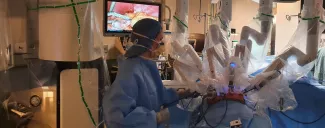Acute Care Surgery
Acute Surgical Care Built on a Tradition of Excellence in General and Trauma Surgery
General surgical departments at academic medical centers are confronted by obstacles to the three traditional academic missions of education, scientific research, and the provision of high-quality care. The growing popularity of specialization has added to the problem by fragmenting the practice of general surgery. Emergency surgical care is time-intensive and associated with prolonged lengths of stay, often requiring specialized procedures to be performed in the middle of the night or on weekends.
In 2005, we reorganized our acute general surgical service at UCSF into what was then called the hospitalist model, a first for an academic teaching hospital in the nation.
Our mission is to provide state-of-the-art acute surgical care for both common and rare conditions encountered in the ER, to address the crisis in patient access to high quality emergent care, and to develop innovative strategies to reduce morbidity and mortality.
Launched in 2005, the Acute Care Surgery Program (formerly known as the Surgical Hospitalist Program) provides high quality and timely care to all patients being evaluated with emergency surgical conditions at UCSF. UCSF was the first academic teaching hospital in the nation to employ this innovative new model where surgeons are dedicated to evaluating patients in the emergency department, as well as those on inpatient wards in need of a surgical consultation.
In 2006, the Institute of Medicine had pronounced in its report "Hospital based emergency care- at the breaking point" that "Emergency medical care in the US is on the verge of collapse," citing "dangerous emergency room overcrowding and an inability to treat patients in a timely and efficient manner as the main reasons." The intent of the Acute Care Surgery Program is to propose solutions to this crisis in access to emergency surgical care, and to enhance patient satisfaction and the delivery of optimal patient centered care for the broad base of surgical emergencies.
The hallmark of our program is the dedicated availability and expertise of faculty who are continuously available to promote continuity of care, improve communication between physicians, and coordinate in-patient care at an academic medical center. In model, full-time board-certified general surgeons provide coverage on a rotating weekly basis, dedicating all of their time to being available for Emergency Department and inpatient consults.
Our intent is to transform the way that emergency surgical care is provided, grounded in the commitment to high quality patient care, education, and research to improve the quality and efficiency of hospital-based surgical care in teaching hospitals.

Rochelle A. Dicker, MD
Section Chief of Acute Care Surgery in the Division of General Surgery at UCSF Surgery
Co-Director of the Surgical Intensive Care Units at UCSF Health
Professor of Surgery and Anesthesia
Affiliated faculty member, Philip R. Lee Institute for Health Policy Studies

